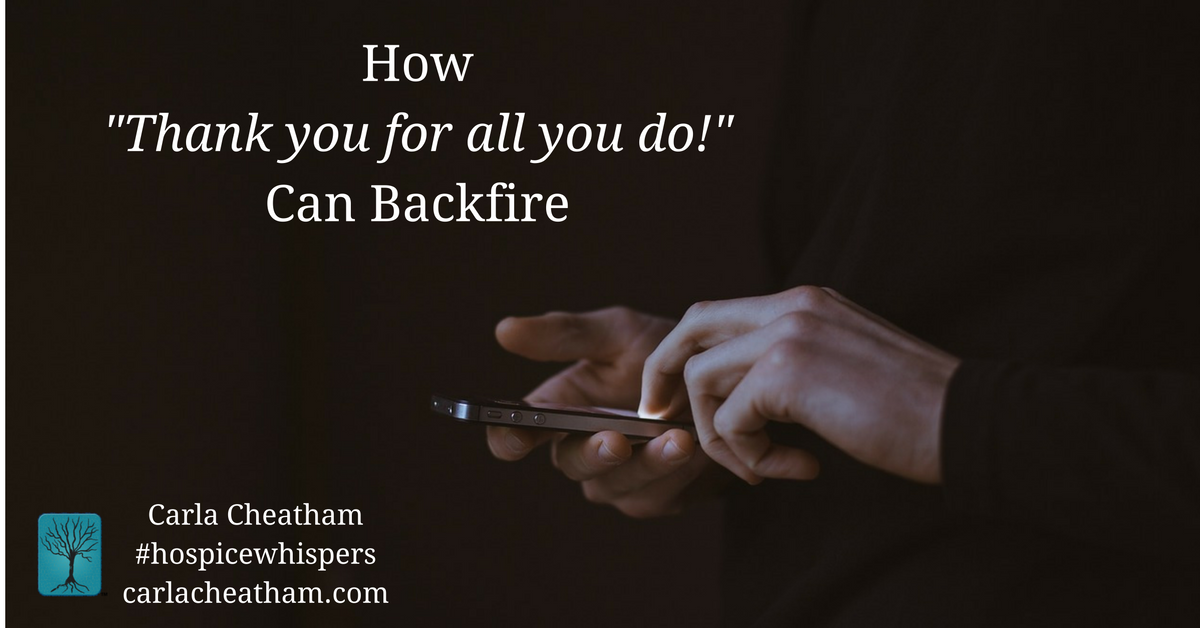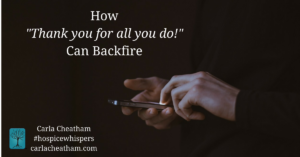
How “Thank You For All You Do” Can Backfire
by Carla Cheatham
A couple of years ago, I led a presentation for a room full of hospice and palliative care managers and administrators. The topic was compassion fatigue, but it wasn’t your typical “Put up appreciation boards” or “Send out cartoon clips each day” kind of talk.
Instead, I approach compassion fatigue from the stance of boundaries, resilience, noticing the stories we are telling ourselves, and focusing on our own behavior rather than blaming everyone else (even though that’s a LOT more fun!)
It’s definitely the grad school version of get real, get honest, and make real changes, but it’s always cool to see participants REALLY go there and open up to a different way of working. By the time they leave, their shoulders are pulled down away from their ear lobes and they say they feel empowered to go back and immediately implement a new way of leading.
At one point, when I was speaking about what they could do to promote healthier teams, my slide read, “Appreciation beyond rote statements…” I described noticing a trend at an organization where I once worked in which managers all started to write, “And thank you for all that you do” at the end of their emails and texts.
“At first”, I said, “we thought, ‘Aaawwww, how nice!’ Then it happened a second time, and we thought, ‘Oh, ok. They must be serious about wanting to acknowledge and thank us’. But by the 5th or 6th or 12th times, it felt trite and rehearsed and made us want to throw up in our mouths a little bit!”
As I spoke, I saw that classic, “Woops, we’ve been doing that!” look. So I said, “It’s like all of you went to the same leadership seminar where they told all of you at the same time to end everything with, ‘And thank you for all you do!’”
At this, the room absolutely erupted in acknowledging laughter. They admitted that they actually HAD been taught to do exactly that.
“Well, STOP it!” I laughingly said, to more laughter from them. And then, more seriously, I said, “When it becomes rote, we stop believing you and feel like it’s just a campaign slogan. It feels kinda like we’re being played or duped into feeling appreciated, especially if nothing else in the organization actually changes other than your signature line to us. It just doesn’t feel good when it begins to seem automatic rather than something you’ve actually thought about, which I completely trust is NOT your goal, at all.”
They nodded with feeling, affirming that this wasn’t at all what they wanted.
I encouraged them, instead of global or generic phrases, to take an extra 15-30 seconds to think of something specific the person or team had said or done in the previous week or two, or even something that you admire and respect about who they are, and use that, instead:
“By the way, Sarah, I couldn’t help but notice how gentle and calm you were with Mr. Smith last week, even when he was really angry and taking it out on you. Thanks for being so compassionate and understanding with the patients with whom we work. It inspires me to want to be even more like that, myself, in work and in life. Thank you for that reminder.”
Or
“Hey gang, I know it’s been extra stressful lately as we’ve been short-staffed. We’re working on it, I promise. But please know that, while we do, I really see how hard each of you are working to pull together, have each other’s backs, get the job done, while also taking good care of yourselves during a tough time. It truly means a lot to me and I could not be more proud of you guys. I wanna be y’all when I grow up!”
Or
“Brian, before I close this note, I want to make sure to tell you, I heard what you said the other day about wanting to stay above board and not cut corners on our contracts. Thanks for keeping us true to our mission, and reminding me to not lose sight of the kind of person I want to be. I appreciate your presence on our team and in my life.”
Or
“Trish, you were spot on with your comments in the meeting yesterday. Your wisdom and insight never ceases to amaze me. Thanks for letting us benefit from that brilliant brain of yours.”
If any of this makes you roll your eyes because it’s too fuzzy woo-woo, that’s fine. Find what feels right in your environment in your voice given your personality and your team’s. But find something!
Gratitude is one of the greatest hallmarks of resilience, for individuals AND teams, while experiencing a lack of reward, community, and fairness are some of the well-documented precursors of burnout. When we feel truly seen for real, sincerely felt, tangible reasons, it makes all the difference in the world. It increases compassion satisfaction and can make enduring challenging seasons in the workplace a lot easier.
Besides, leaders set the tone for a team, for good or for ill, and that kind of intentional, genuine noticing and naming of the good we see in others can be contagious. You can’t afford to NOT take the few extra moments to build them up.
Thank you for being willing to stretch, spend a little extra time, and find new ways each day to make sure your team knows exactly the what and why behind your words of appreciation. You make more of a difference in their daily lives and how they feel about their work than you’ll ever really know.
Peace,
Carla
 Rev. Dr. Carla Cheatham began her career in social services with an MA in Psychology and certification in crisis counseling. After earning her PhD in Health and Kinesiology and an MDiv, she served faith communities and led an interfaith non-profit supporting working justice. Carla then went on to work for 10 years in hospice as a chaplain and bereavement coordinator. Now she is a national keynote speaker teaching professional caregivers about presence, healthy teams, boundaries, compassion fatigue, ethical care, spiritual and existential support for all, and much more. She is the author of Hospice Whispers: Stories of Life and also Sharing Our Stories: A Hospice Whispers Grief Support Workbook available through Amazon. Learn more at CarlaCheatham.com
Rev. Dr. Carla Cheatham began her career in social services with an MA in Psychology and certification in crisis counseling. After earning her PhD in Health and Kinesiology and an MDiv, she served faith communities and led an interfaith non-profit supporting working justice. Carla then went on to work for 10 years in hospice as a chaplain and bereavement coordinator. Now she is a national keynote speaker teaching professional caregivers about presence, healthy teams, boundaries, compassion fatigue, ethical care, spiritual and existential support for all, and much more. She is the author of Hospice Whispers: Stories of Life and also Sharing Our Stories: A Hospice Whispers Grief Support Workbook available through Amazon. Learn more at CarlaCheatham.com

